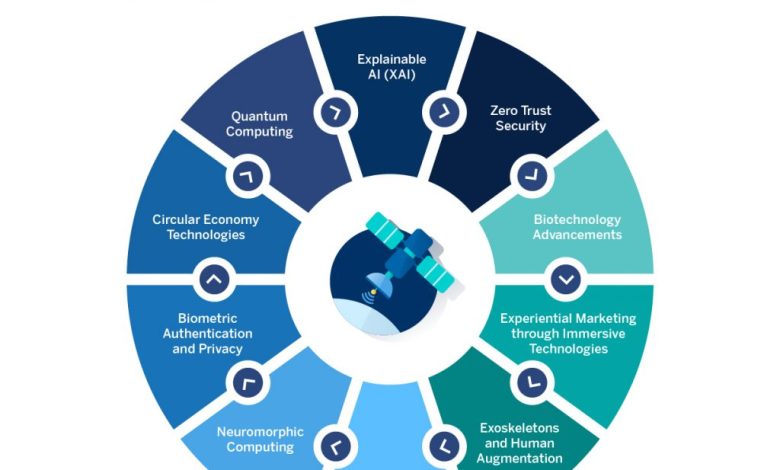New Technologies Shaping the Future of Blockchain

- The Evolution of Blockchain Technology
- Impact of Artificial Intelligence on Blockchain
- Blockchain and Internet of Things (IoT) Integration
- Enhancing Security with Quantum Computing in Blockchain
- The Rise of Decentralized Finance (DeFi) on Blockchain
- Exploring the Potential of Blockchain in Supply Chain Management
The Evolution of Blockchain Technology
Blockchain technology has undergone significant evolution since its inception. Initially known for its association with cryptocurrencies like Bitcoin, blockchain has now expanded its applications to various industries beyond finance. The evolution of blockchain technology has been driven by the need for increased security, transparency, and efficiency in digital transactions.
One of the key advancements in blockchain technology is the development of smart contracts. Smart contracts are self-executing contracts with the terms of the agreement directly written into code. This innovation has revolutionized the way contracts are created and enforced, eliminating the need for intermediaries and reducing the risk of fraud.
Another important development in blockchain technology is the rise of decentralized finance (DeFi). DeFi refers to the use of blockchain and cryptocurrency to recreate traditional financial systems such as lending, borrowing, and trading without the need for intermediaries like banks. This has democratized access to financial services and opened up new opportunities for individuals and businesses.
Furthermore, the integration of blockchain technology with other emerging technologies like artificial intelligence (AI) and Internet of Things (IoT) has led to the creation of more sophisticated and interconnected systems. These advancements have the potential to streamline processes, improve data security, and enhance the overall user experience.
Overall, the evolution of blockchain technology has paved the way for a more secure, transparent, and efficient digital future. As the technology continues to mature and expand its applications, we can expect to see even more innovative solutions that will shape the future of various industries.
Impact of Artificial Intelligence on Blockchain
Artificial Intelligence (AI) is revolutionizing the way blockchain technology operates. The integration of AI with blockchain has the potential to enhance security, efficiency, and scalability in various industries. By leveraging AI algorithms, blockchain networks can automate processes, detect fraudulent activities, and optimize decision-making.
One of the key impacts of AI on blockchain is the improvement of data analysis and pattern recognition. AI-powered tools can analyze large volumes of data on the blockchain to identify trends, anomalies, and potential risks. This enables organizations to make more informed decisions and mitigate potential threats effectively.
Moreover, AI can enhance the consensus mechanisms used in blockchain networks. By incorporating AI algorithms, blockchain platforms can achieve faster transaction speeds, lower costs, and increased throughput. This can significantly improve the overall performance of blockchain networks, making them more competitive in the market.
Another significant impact of AI on blockchain is the development of smart contracts. AI can be used to create intelligent contracts that can automatically execute actions based on predefined conditions. This can streamline business processes, reduce the need for intermediaries, and increase the overall efficiency of transactions on the blockchain.
In conclusion, the integration of AI with blockchain technology is reshaping the future of various industries. By harnessing the power of AI algorithms, blockchain networks can achieve higher levels of security, efficiency, and scalability. This synergy between AI and blockchain is paving the way for innovative solutions that have the potential to transform the way we conduct business and interact with technology.
Blockchain and Internet of Things (IoT) Integration
The integration of **Blockchain** technology with the **Internet of Things (IoT)** is revolutionizing the way data is collected, stored, and shared. By combining the security and transparency of blockchain with the connectivity and automation of IoT devices, businesses can create a more efficient and trustworthy system for managing their data.
One of the key benefits of integrating blockchain with IoT is the ability to create a tamper-proof record of data collected from IoT devices. This ensures that the data is secure and cannot be altered or manipulated, providing a high level of trust in the information being shared. Additionally, blockchain technology allows for the creation of smart contracts that can automate processes based on predefined conditions, further streamlining operations.
Another advantage of combining blockchain and IoT is the increased efficiency in data management. With blockchain’s decentralized ledger, data can be stored securely across multiple nodes, reducing the risk of a single point of failure. This distributed approach also improves data integrity and reliability, as information is verified by consensus among network participants.
Furthermore, the integration of blockchain and IoT enables new business models and revenue streams. By securely sharing data through blockchain networks, companies can create new opportunities for monetizing their information, such as selling access to real-time IoT data streams or offering data analytics services to third parties. This opens up a whole new world of possibilities for businesses looking to capitalize on the growing trend of interconnected devices.
In conclusion, the integration of blockchain and IoT is reshaping the future of data management and connectivity. By leveraging the strengths of both technologies, businesses can create a more secure, efficient, and profitable system for collecting and sharing data. As the adoption of IoT devices continues to grow, the importance of blockchain integration will only become more apparent in ensuring the integrity and reliability of the data being generated.
Enhancing Security with Quantum Computing in Blockchain
Enhancing security in blockchain technology is crucial for maintaining trust and integrity in the digital world. One of the emerging technologies that hold promise in this regard is quantum computing. Quantum computing has the potential to revolutionize the way we secure data and transactions on the blockchain.
Quantum computing operates on the principles of quantum mechanics, allowing for the processing of vast amounts of data at speeds unimaginable with traditional computers. This speed and processing power can be leveraged to enhance the security of blockchain networks by making it more difficult for malicious actors to compromise the system.
One of the key advantages of quantum computing in blockchain security is its ability to break traditional encryption methods. As quantum computers can factor large numbers exponentially faster than classical computers, they pose a threat to the cryptographic algorithms currently used to secure blockchain networks.
To address this threat, researchers are exploring new encryption techniques that are resistant to quantum attacks. These post-quantum cryptographic algorithms aim to secure blockchain transactions against potential quantum threats, ensuring the continued integrity of the system.
By integrating quantum computing into blockchain technology, we can enhance security measures and stay ahead of potential threats in the digital landscape. As quantum computing continues to advance, it will play a vital role in shaping the future of blockchain security and ensuring the trustworthiness of decentralized systems.
The Rise of Decentralized Finance (DeFi) on Blockchain
The rise of decentralized finance (DeFi) on blockchain has been a significant development in the world of cryptocurrency and blockchain technology. DeFi refers to the use of blockchain technology and smart contracts to create decentralized financial systems, allowing users to access financial services without the need for traditional intermediaries such as banks or brokers.
One of the key advantages of DeFi is its ability to provide greater financial inclusion by allowing anyone with an internet connection to access a wide range of financial services. This has the potential to revolutionize the way people around the world access and interact with financial products and services.
DeFi platforms are built on blockchain technology, which ensures transparency, security, and immutability of transactions. This means that users can trust that their financial transactions are secure and cannot be tampered with. Additionally, the use of smart contracts automates the execution of agreements, reducing the need for manual intervention and the associated risks.
As DeFi continues to gain traction, we are seeing an explosion of new decentralized applications (dApps) that offer a wide range of financial services, including lending, borrowing, trading, and asset management. These dApps are built on blockchain platforms such as Ethereum, which provide the necessary infrastructure for developers to create and deploy decentralized applications.
Overall, the rise of DeFi on blockchain represents a major shift in the financial industry, offering new opportunities for innovation and disruption. As more users and developers flock to DeFi platforms, we can expect to see continued growth and evolution in this space, shaping the future of blockchain technology and finance as we know it.
Exploring the Potential of Blockchain in Supply Chain Management
Blockchain technology has the potential to revolutionize supply chain management by providing transparency, security, and efficiency in tracking goods from their origin to the end consumer. By utilizing blockchain in supply chain management, companies can create an immutable record of transactions, ensuring that all parties involved have access to real-time data.
One of the key benefits of blockchain in supply chain management is its ability to enhance traceability. With blockchain, each step of the supply chain process can be recorded and verified, allowing for greater visibility into the movement of goods. This increased transparency can help companies identify and address issues such as fraud, theft, or counterfeit products.
Another advantage of blockchain in supply chain management is its potential to streamline processes and reduce costs. By automating tasks such as inventory management, payment processing, and contract execution, blockchain can help companies save time and resources. Additionally, the decentralized nature of blockchain eliminates the need for intermediaries, further reducing costs and increasing efficiency.
Furthermore, blockchain technology can improve trust and collaboration among supply chain partners. By providing a secure and tamper-proof record of transactions, blockchain can help build trust between parties and facilitate more seamless communication. This increased trust can lead to stronger relationships and more effective collaboration throughout the supply chain.
In conclusion, the potential of blockchain in supply chain management is vast. By leveraging this technology, companies can enhance traceability, streamline processes, reduce costs, and improve trust among supply chain partners. As blockchain continues to evolve, its impact on supply chain management is likely to grow, shaping the future of how goods are tracked and managed throughout the global supply chain.



